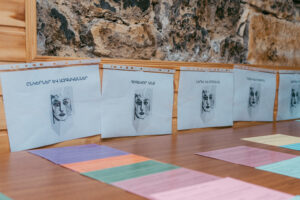Break the silence, challenge stigma, change attitudes and create safe spaces for open and supportive conversations about domestic violence.
Photo: UN Women
“In our society, people often say that if someone killed someone, the victim must have done something wrong. This way of thinking needs to change. Attempts to justify the perpetrator’s actions are simply unacceptable,” shared one participant during the recent In Her Shoes simulation game held in Ashtarak.
The session brought together teachers, active youth, and civil society representatives to engage in a powerful role-playing experience. The simulation allowed participants to follow the journey of women subjected to violence, gaining insight into how stereotypes, the absence of support systems, and limited resources shape their experiences. Through guided group discussions, participants explored these dynamics and reflected on how attitudes within society can either enable or challenge violence.
“The main goal of In Her Shoes is not just to inform participants about domestic violence,” explains Karen Ayvazyan, Programme Manager at the OxYGen Foundation. “It’s about transforming attitudes, encouraging people to reject indifference, never justify violence, and stop blaming survivors.”
The simulation is being implemented across six regions of Armenia: Ararat, Aragatsotn, Gegharkunik, Shirak, and Vayots Dzor, to reach at least 800 participants from a range of sectors. Delivered in partnership with women’s support centers and local NGOs, the initiative also connects participants to referral mechanisms and support services, ensuring continued impact beyond the sessions.
This initiative is carried out by OxYGen Foundation in the framework of the “EU 4 Gender Equality: Together against gender stereotypes and gender-based violence” programme (phase 2), funded by the European Union, implemented jointly by UN Women and UNFPA.
This article was produced with the financial support of the European Union. Its contents are the sole responsibility of UN Women and UNFPA and do not necessarily reflect the views of the European Union.

